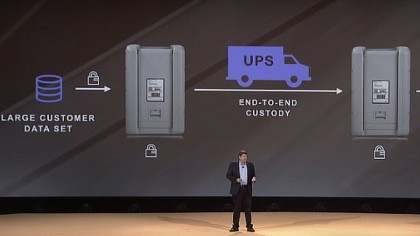Snowball: Why did Amazon just make a hard drive with a Kindle attached?
It's about moving big data, but is the 50TB Snowball retro thinking?
Snowball and big data
With Snowball, transferring a petabyte of data takes about 15 hours, and costs about a fifth as much as using the internet, according to AWS. This is about big data – and how to move it. "One of our customers told us they wanted to move 250 petabytes to the cloud, but worked out that it would take eight years," said Bill Vass, VP technology, AWS, at Snowball's launch.
An app on the AWS management console must be pointed at the dataset you want to move, and it then figures out how many Snowballs you'll need. Kindles on the Snowballs are then automatically changed to show your address, and then they ship.

Who is going to use Snowball?
This hunk of hardware isn't just designed to make it easier and quicker for those with large datasets to migrate to the cloud. It's about spreading the cloud to companies who are yet to embrace it.
"I expect Snowball is going to open up a larger section of the market, especially the archival market – companies that contractually have no choice but to keep data for a number of years," says Shane Owenby, MD for Asia-Pacific at AWS, who suggests that Snowball is aimed primarily at financial companies, call centres, governments, media entertainment companies who archive films (especially those now switching to 4K films), and any other organisations that have petabytes of data, but not the years to upload it conventionally.
"They don't want to blow-out a network pipe, and we can keep that data much cheaper than they can," adds Owenby.

Will we see more hardware like Snowball?
"We don't have any current plans to do so," says Jassy. "The only reason we built this appliance was to help customers get more of their data into AWS more quickly – we had enough of talking to customers who had large amounts of data and couldn't stomach the idea of trying to put it on the cloud via the internet on their current connection."
AWS would rather sit underneath hardware, said Jassy, name-checking Nest, Dropcam, and Amazon's own Echo as IoT devices that already use its cloud. "This was a little bit of a novelty for us." Novelty or not, Snowball could be big news for companies sitting on the biggest chunks of big data.
Sign up to the TechRadar Pro newsletter to get all the top news, opinion, features and guidance your business needs to succeed!
Jamie is a freelance tech, travel and space journalist based in the UK. He’s been writing regularly for Techradar since it was launched in 2008 and also writes regularly for Forbes, The Telegraph, the South China Morning Post, Sky & Telescope and the Sky At Night magazine as well as other Future titles T3, Digital Camera World, All About Space and Space.com. He also edits two of his own websites, TravGear.com and WhenIsTheNextEclipse.com that reflect his obsession with travel gear and solar eclipse travel. He is the author of A Stargazing Program For Beginners (Springer, 2015),
